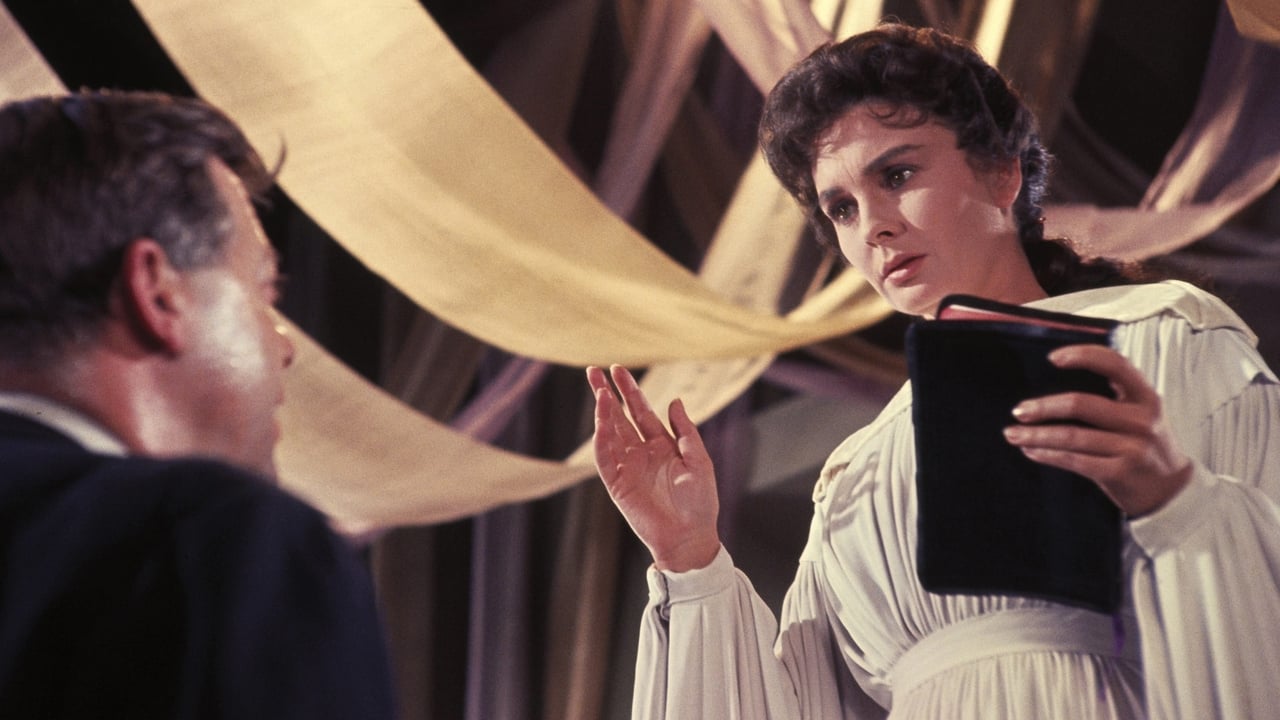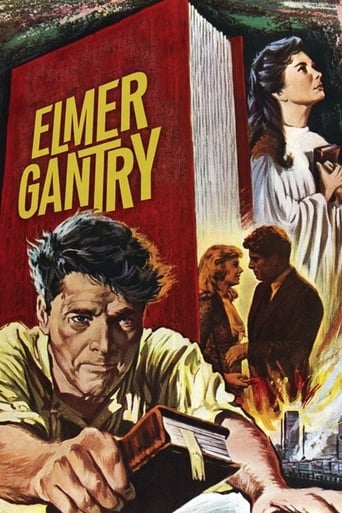

Waste of time
... View MoreCrappy film
... View MoreA bit overrated, but still an amazing film
... View MoreAll of these films share one commonality, that being a kind of emotional center that humanizes a cast of monsters.
... View MoreIt's the prohibition era. Elmer Gantry (Burt Lancaster) is a slick traveling salesman who is a boozer and a dog hound. He is a born salesman well versed with the bible. He is so good that it is hard to tell the difference whether he's sincere or lying. He is one haunted by his checkered past and his immorality. He is taken with Sister Sharon Falconer (Jean Simmons) who runs revival meetings. She's a true believer. He badgers her until she allows him to preach. He becomes so successful that he becomes indispensable to Sister Sharon's roadshow. Bill Morgan sees thru Elmer and tells Sharon that in 1917 he was expelled from the seminary for seducing the deacon's daughter. She ignores the warning and they become a great success in the big city. Then his past comes back to haunt him in the form of Lulu Bains (Shirley Jones) who is now a prostitute.Burt Lancaster gives such a big performance. It is so big that it always has a tinge of falsehood. His laugh is so outrageous that it plays both sides of the divide. It's this big performance that is so memorable. Jean Simmons is the perfect compliment. She is the embodiment of purity of spirit. Burt definitely deserves his Oscar win. I can see some people taking offense from the depiction of religious revival. However I see a great role model in Sister Sharon. It's also a tale of salvation for Elmer Gantry.
... View MoreI'm going to take the minority view here, although I see I am not alone...just outnumbered. I think this is an atrocious performance by Burt Lancaster...at least until the final third of the film. As several have pointed out...way over the top. More deserving of a Razzie than an Oscar. And, just for the record, there are lots of wonderful performances by Lancaster...this just isn't one of them.That's not to say this is a bad film. It's a strong script. All the more so in the last third of the film after things start going down for Mr. Gantry. And the closing scenes of the film are tremendous.But just as importantly, there are a number of wonderful performances here. In particular, I was impressed with Jean Simmons. And, I might add, it is rare that I am not impressed with her, even though her star has certainly faded over the years; but what a strong and impressive actress she was. Dean Jagger has long been a favorite character of mine, and no less so here. What a strong performance. The only miscasting I see is Patti Page; a wonderful singer, but a pitifully bland actress...as is reflected in her filmography of 3 titles; in reality, she's pretty much irrelevant here. Shirley Jones was quite acclaimed her, and although her performance is satisfactory, she's done much better in other films.This is a film that movie aficionados should watch...at least once.
... View More... this one would have been one of the greatest ever, and would have better withstood the test of time. Story by Sinclair Lewis! Directed and adapted for the screen by Richard Brooks! Starring Burt Lancaster and Jean Simmons, both mega-stars. And -- get this -- a "supporting cast" that includes the likes of Patti Page, Shirley Jones and Dean Jagger. How can you go wrong? From my notes on a third viewing: 1. The adaption was major. Some literary experts felt the novel had been de-nuded. 2. The film has a backwards feel to it, that it, the earlier scenes where the characters are introduced feel more genuine than the contrived plot twists that come later. This is the sign of a project that ran away from the director. 3. Patti Page is seriously under-utilized (both as to voice and acting) and Dean Jagger always plays the same character, which can be both a benefit and a liability. 4. The key to this film is, was, and always will be Lancaster. Was this part written for him or did he adapt to the part? There is mystery indeed. Many if not all of the gestures and mannerisms attributed to Elmer are, coincidentally, the very same gestures and mannerisms that Burt was known for. Lancaster was one of the most physical actors of the period. He had hands the size of toasters. He was an ex-acrobat. Years before this film was made, he did a self-parody pirate film called the CRIMSON PIRATE. No one would have thought of giving him an Oscar for that film, but if you view the two side by side you will find that the gestures mannerisms and speech patterns are almost identical. 5. Lancaster was nearing 50 by the time this was made. To answer the question asked above, this reviewer does believe the part was written with him in mind; and moreover that Hollywood chose to honour him for his incredible body of work with the ultimate prize for this film. Nothing wrong with that, don't get me wrong, but, in this context you see the film is no longer one of greatest films of all times (awards notwithstanding) but rather one of the most over-acted and over-written films of all time. Big difference. 6. Later in life, Burt, actually one of my favourite performers, learned to act using the principle "less is more." Have a look at Scorpio, done over a decade later.
... View MoreElmer Gantry had nothing new for me in terms of plot. So I was looking forward to good acting to tide me over. Burt Lancaster won an Oscar for his role in this film. But frankly his performance was a bit hammy at times. Certain scenes did require a hammy performance, especially when he was preaching but he did that a lot. Jean Simmons was a delight though. I am a big fan of Audrey Hepburn and she reminds me of her. So that maybe a big reason why I liked her. Another thing that I didn't like was the character Elmer Gantry. The audience is never given a clear picture of him. Is he just a conman or good guy ? Instead he is shown as something of a conman with heart of gold. He just switches between good and bad so fast that I was sometimes left puzzled.
... View More